Editor's note: These poems were originally published in the June 1980 edition of Artspace Magazine and republished by La Alameda Press in 1997. Drawings are by Rini Price and video is by Cindy Young for Chatter.
A Moral Tic
This version of the seven deadly sins is neither a religious nor a didactic exercise. It is the result of curiosity, of an effort to learn if the seven sins of Greco-Roman and Judeo-Christian tradition could be useful to a modern pagan such as myself, a person who is involved, however haltingly and independently, in the inner battle, the psychomachia, the conflict between the evolving spirit of one’s better nature and those consuming forces within one which work, like entropy, to undermine and obstruct that development.
Living in a darkening age as we do, one in which the potential for destruction and potential for knowledge collaborate with equal power, the concept of sin, of the tendency to moral failure – to “missing the mark,” as Reinhold Niebuhr translates from “original scripture” the Greek word hamartia – is as applicable to the understanding of politics and history as it is to the processes of self-revelation. The seven deadly sins themselves, however, are linked by many with folklore and fundamentalism. They seem like ethical cartoons to those who first encounter them. When I became conscious of them nearly 33 years ago, I found some hopelessly extraneous and others cruelly primitive. But they caused in me what I felt like a moral tic, a faint, involuntary affinity that I couldn’t shake and that made me think it might be worth my effort to try to conserve them for myself. Against the background of what seemed to be their traditional definitions, I examined each of the seven sins, using poetry as an instrument of perception, giving each a new translation that coincided to some degree with my knowledge of my own personal failings, and with my opinions about propensities to moral failure in the modern world.
Partly because of my uneasiness with institutional religions and the pious heaviness and hypocrisy associated with the idea of sin, and partly because evil is as much a matter of ridicule as it is of pain, the poems developed into what I now call mock sermons, brief comic monologues composed in the editorial and satirical third person, and cast, irreverently, as artificial sonnets. The poems are written to be declaimed.
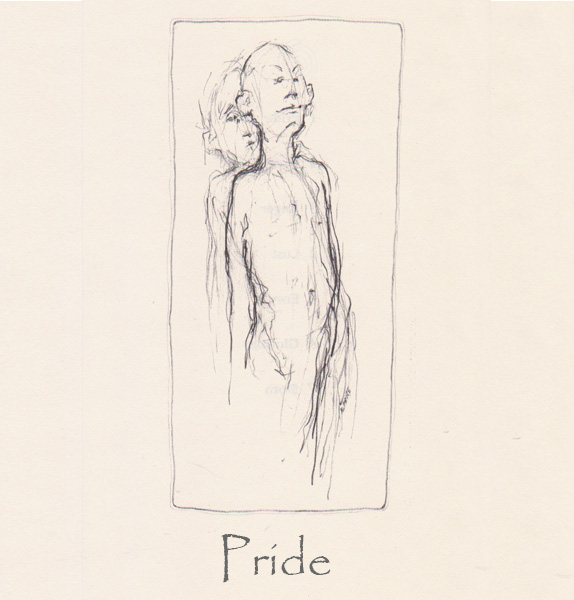
It becomes your soul: that sucking itch, that mortal titter, blushing
under all the layers of your life, it knows you – that you’re not
good enough for yourself. And so, the Oz contraption,
the trick transparency, the only out: to impress yourself, on others,
with yourself. It’s done inside with props, with mirror mind pools,
two-way, sylvan, with a funhouse warp in which to gaze – triumphant,
the glory in your eye, presuming all the world is eager
for every nuance you contrive. But impressive others won’t impress;
they’re there inside, behind the mirror, peeping out at little you
buffooning, seeing nothing of the image of yourself you see,
only posturings and mediocrity. You know their eyes:
even you can see that who you are humiliates who you want to be,
that in comparisons like these there’s nothing left of you
but ironies, but pretensions at self-love which are self-mockeries.

It’s not the having, or the hoarding,
it’s a categorical thing, an abhorrence of less – it’s the wanting,
wanting it all, wanting it all so much
you cease to care for that part of the all that you already have,
and yet it’s the very same thing that you’re wanting, and so
both in the end are worth nothing at all. The absence is all
-- don’t settle for anything less, just ultimates
and ultimatums – like losing your life in a haze of regret
for what it is not, demanding the absolute way it should be,
throwing away the wind, let’s say, because it’s at home
and not at sea, wasting good days, depressed,
possessed by the best they could be – wanting it all,
ignoring the stars you’ve charted for years
simply because they aren’t all the rest.

A hard spot in the brain, a foetal core, it feeds
upon submission, swells, gets sore, a strangling pressure
that has to be appeased -- and it is so easy to give in, so
helplessly fulfilling, it justifies all superstition:
No matter how brief or just, just to feel it, the bloating
of its hard sharp heat, the burning sweetness, is to know
the pleasure of an agony that is the opposite of love.
A mad opacity, it seals us in, makes us godly to ourselves,
permitting us to see only our own reality, to feel no cruelty
in our hardness, only violent right. Possessed
by the demon of our lives, our Hyde, a toxic constipation
forcing its relief, we sacrifice our lives, let go, enjoy it,
the elation of release; its birth: a poisonous self-titillation
in which our being is replaced by its own elimination.
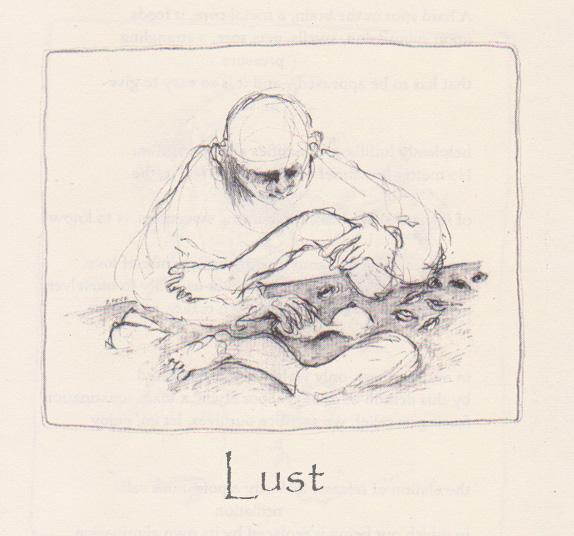
Victims and idolaters, vacancies to solve, we pursue
such teasing expectations – not be be confused with excess, sex,
passions, and desires, but those mock familiar forms, icons
to appease us – seeing all we are, and must become,
completed for a moment in some likeness, some beauty, wanting,
peace, or lie, external, statuesque, but belonging to our lives.
Embellishing extinction, cannibals, we specialize in bits and pieces
wooed from other lives, savoring deep semblances, charmed carrion,
irresistibly dismembered. Monsters, thus assembled, for us the crime is not
the wanting, but the harm – injustice – the used result: excluding them,
and all they are, for the worshipped parts we take from them,
giving our whole lives away at times for what we think will solve us,
make us whole, absolve us, charm us into idols, answers, bit and pieces,
lovers, prey for the teasing needs and vacancies of others.
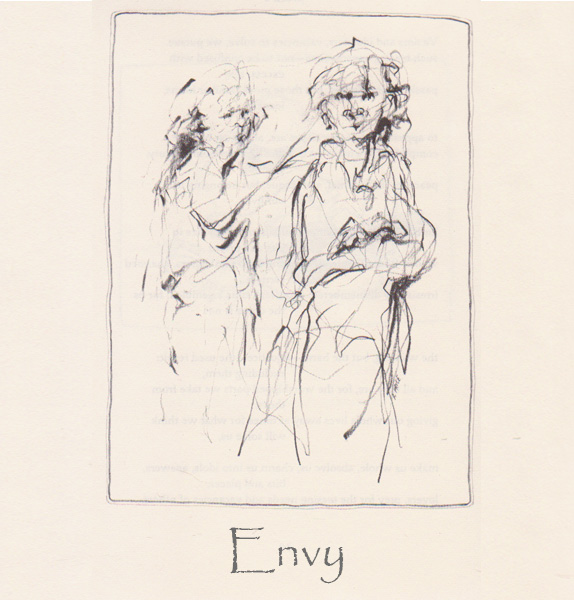
Boas entwined, constricted, rigid in a single egg,
envy and lust are in the same bind: both make others
the final solution; but envy’s the one that mangles with laughter,
the silliest sin, a total self-trade-in for somebody else,
a brain transplant for the good of the taker.
Ah, there he goes, the have-it-all hero, the donor you’d have
make you a victim. This host of our wishes: you’d scoop out your life
--utterly squander all that you are – to make room for the idol
you’ve made out of his. This is something much worse
than a groveling self-nihilation. By wanting to be who you are not
you toy with the tyrant’s art – presuming that others are not
irreplaceable wholes, exclusively true to their beings, but
mere totals of stuff, sums with no soul or order, you render them down
to their easiest parts, so all the parts fit all the parts.
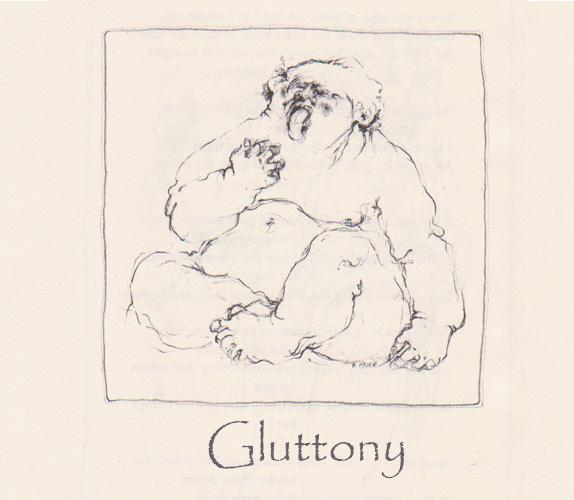
Like a thing that we know but won’t understand,
we feel, one day, with the edge of our minds, a cannibal softness
take over the spine; tendrilling out like syrupy vines,
weaving, caressing, out of control, ravenous comforts
splurge through the bone, claiming the host the spine calls home.
And we find, one day, that we won’t say no.
The parasite owns us, we do what it does: we indulge
luxurious “rights” and reflexes, growing immense,
inescapably soft, excreting a sweetness that covers the globe.
And then to our horror we know: we’ve become our own host,
lured by our own verdant decay – we cannot resist even this –
and sink, agape, capsized, euphoric, the sole superfluous
link in the chain. And the earth absorbs all that we’ve been
till all that is left is an interesting stain.
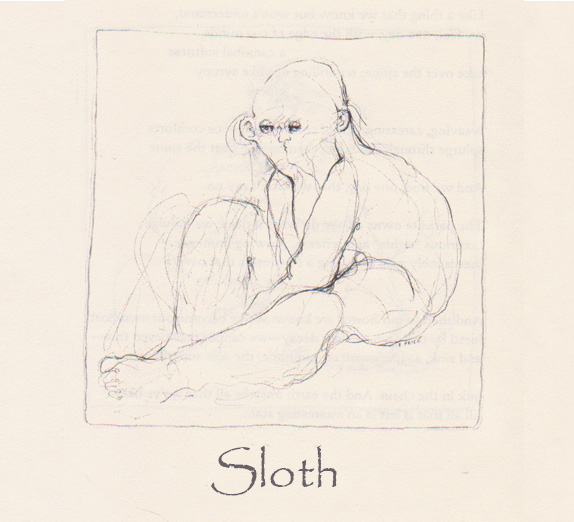
Itching, soft, becalmed, asleep like snails
skidding in their shells, postponing our lives until the “right time,”
we go easy on ourselves, do nothing once again, say yes
over and over again, desperately at ease. Our energy ingrown,
self-poisoned, we watch in creamy horror as we bloat and hiss,
happy and appalled at the tepid lulling muck, the tempo of our wills,
on which we float, as our fate curls up from lack of use.
We know what we should do, do justice to our lives at least,
compete with chance, add choice to our sum of history and luck.
We know! But we can’t, we can’t start up. Misers,
paralyzed by habit, we arrive at the end too late for our lives,
full up and empty at the same time; the best of ourselves, our only duty,
put off each day, stillborn, without a breath – a gravid nullity
swelling with our time, creating, with our lives, a death.




Responses to “7 Deadly Sins”